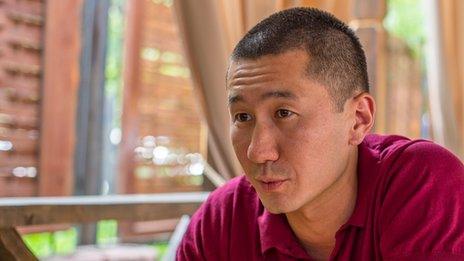The Kazakh restaurateur with global ambitions
- Published

At just 28 years old, Askar Baitassov has built the biggest restaurant business in Kazakhstan. Now he wants to introduce high quality Central Asian cuisine to the world.
"I always dreamed of becoming rich by the time I was 25, so that I could buy myself a really expensive car," says Mr Baitassov.
He is sipping on a blackcurrant drink at one of his numerous restaurants in Almaty, Kazakhstan's largest city and commercial centre.
"But when I turned 25 my dreams changed, and now I want to realise my global restaurants ambition."
'Cultural contribution'
Kazakhstan is a huge country the size of Western Europe. Led by its oil wealth, its economy is continuing to expand strongly. As a result it has a growing middle class who like to eat out.
Yet until fairly recently restaurants in Almaty were typically poor copies of popular Moscow chains, or extremely extravagant establishments with almost no clientele.
Food was hit and miss, and service was always poor.
Mr Baitassov's success has been to introduce attractive venues with imaginative design and friendly professional staff. Food is usually of a high standard at affordable prices.
His company AB Restaurants now has more than 30 restaurants, ranging from those selling Italian, Georgian, or Russian cuisine, to American burger joints, and European coffee shops.
He believes his chain of restaurants and cafes is contributing to a positive social change in Kazakhstan's society.
"A couple of years ago, I realised that through our restaurants we can influence urban culture, the atmosphere in Almaty, and the visitor's perception of the city," he says.
"I want to keep contributing towards the development of this culture."
Mr Baitassov adds: "Our target audience is modern city dwellers, progressive, educated, those who travel and speak several languages. We want to create social places for these people to come together."
'Calculated steps'
Born in a small Kazakh village, Mr Baitassov's family moved to Almaty when he was five.
He first tried his hand in the hospitality sector in his late teens, but initially in alcohol rather than food.
"I started off by managing two beer bars, which my father, a successful property developer, invested in," he says.
"I then studied management in Moscow and Holland, and always wanted to try my hand at the restaurant business."
Returning to Kazakhstan, and with initial financial backing from his father, he launched his restaurant business with just three employees. Today he has a team of 1,200 workers.
To keep costs down, he rents instead of buying sites for his restaurants, and invests his own money instead of using bank loans.
Mr Baitassov's success in leading and expanding his company saw him awarded the title of Kazakhstan Entrepreneur of the Year 2013 from global accountancy group Ernst & Young.
Yet despite his triumphs in the restaurant field, he admits making mistakes along the way, such as moving into the nightclub sector.
"Nightclub ownership here is a dirty business," he says.
"When the project does not fulfil our expectations we shut it down, over the years perhaps about 10 such ventures were shut down. But nowadays we tend to take more calculated steps."
Business not politics
Despite Almaty having a growing middle class who can afford to eat at Mr Baitassov's restaurants, there is still a big wealth gap between the country's urban elite, and the poor majority.
First time visitors notice the striking difference between the downtown areas of the big cities such as Almaty, where luxury malls are being built and people drive expensive cars, and the shabby, pot-holed suburbs where many low-income residents live.
Does it bother Mr Baitassov to see these two faces of Kazakhstan?
"Yes it does, but I am not a politician or the mayor of the city," he says.
"I care about these things, but in order to improve things it has to be a joint effort including the municipal authorities. I prefer to focus on my business."
Inspirations abroad
A source of inspiration for Mr Baitassov's restaurants is his numerous travels around the globe. He says he tries to get away at least twice a month.
"When I am travelling I try to eat out in as many places as possible.
"Breakfast in one place, brunch in another, lunch and dinner in other restaurants - I eat out all the time. I order lots of food just to taste it, but I can't eat it all of course."
Mr Baitassov then brings some of the ideas back home, where he adapts it to local tastes, customs and products.
But now he plans to reverse that trend, and take Central Asian cuisine - such as steamed dumplings filled with spicy lamb - to major cities around the world.
He says he learnt a great deal from attending the ceremony in Monaco for his entrepreneurship award, which was held in June.
"After meeting all these successful businessmen, most of them billionaires, I realised that in order to build a global business I have to think globally."
But far from rushing into things, Mr Baitassov is working hard to ensure that his future global restaurant chain runs like clockwork.
"I want to build a restaurant mechanism that is as accurate, transparent and efficient as a Swiss watch. It has to be as reliable as the Swiss watch," he says.